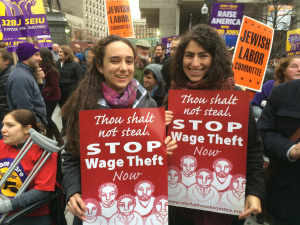This beautiful d’var torah was written by Salem Pearce, a rabbinical student at Hebrew College and a participant in our online course Don’t Kvetch Organize! It originally appeared on Salem’s blog No Power In The ‘Verse.
On Tuesday afternoon, I skipped my halakha class in order to attend a “Fight for 15” rally downtown. This local effort was part of a nationwide day of action, a “March for Racial and Economic Justice,” aimed at increasing the minimum wage in our state to $15/hour. Outside of Faneuil Hall, we listened to a dozen plus speakers, and then we marched with our signs about a quarter of a mile to the state house, where we heard from state Sen. Dan Wolf about a bill that would mandate a $15/hour wage for fast food and big box store employees. The bill has moved out of committee and now heads to the full Senate. If implemented, the policy would effect more than 200,000 workers in the state, many of whom now make less than $10/hour.

Author Salem Pearce with her friend
I learned about the event through an organizing class that I’m taking this semester: The local group JOIN for Justice is pioneering an online course called “Don’t Kvetch! Organize!” The class has participants from all over the country. At the rally I met up with several of my Boston-area classmates, as well as a few JOIN staff members. The action was meant to be a way to put into practice, or at least witness, some of what we’ve learned so far.
The speakers at the rally represented a wide variety of workers: All people of color — and more than a few undocumented immigrants — they included students, home health care workers, fast food employees, adjunct college professors, and child care providers. One woman spoke about her eldest daughter, the first in the family to get into college — and then told of her sadness at the family’s not being able to afford that college. A fast food employee testified that he was striking that day — for the 11th time in three years — for $15/hour and the right to unionize at the McDonald’s where he works. The adjunct compared her insufficient full-time salary, and the paltry wages of the university’s staff, to that of her college president, who makes $3 million/year. They had in common long hours, exhausting work, job insecurity, lack of benefits, and painful choices around spending because of their paltry compensation.
I am proud to report the robust Jewish presence at the rally. Besides the JOIN students and staff, also represented were the New England Jewish Labor Committee, the Jewish Alliance for Law and Social Action, Moishe Kavod House, and the Boston Workmen’s Circle, plus just some individual, good old fashioned Jewish activists — some of whom are part our community here in JP and at Nehar Shalom. And this is just here in Boston: All over our country, from L.A. to Chicago to Miami, on Tuesday Jews marched for racial and economic justice.

This demonstration of our commitment to justice as Jews got me started thinking about the Jewish values that underpin that commitment. I’ve learned — and will teach as a rabbi — lots of texts that speak directly to those values and that commitment. But this week, as I learned part of our parshah to chant tomorrow morning, I wondered about workers’ issues in relation to Toledot.
This week’s parshah, as so many in Genesis, is filled with the continuing family drama of the Abrahamic line. Rivka gives birth to twins Esav and Ya’akov, who spend their lives at odds with each other, starting in utero. The tension between them, the text explains, stems from their differences.
Esav is a character derided by the Jewish tradition. Depicted as a brute, unintelligent, and powerful man of the field, Esav is often seen as the opposite of the rabbinic ideal of his brother Ya’akov. Rashi even sees a religious difference between them: He claims that at bar mitzvah age, Ya’akov went to yeshiva, and Esav turned to idol worship. But before being swindled out of his birthright over a bowl of lentil stew, Esav comes home from working in the field all day. The Torah makes a point of noting that he was עָיֵ֖ף, “tired.” Rabbi Joseph Soloveitchik explains the significance of this verse: “Esau came tired from all his accomplishments and all his conquests. He was exhausted and disappointed . . . [And so the verse says], Esau came from the field and he was tired . . . Focused solely on physical success, Esau finished his day existentially exhausted: unfulfilled, demoralized, and disappointed.”
Before I explore this further, I want to note that this interpretation of Ya’akov and Esav is uniquely Jewish. Growing up a Protestant, I learned the story of the warring twin sons of Yitzhak quite differently: I was taught to strive to be like Esav, not Ya’akov, who in my tradition was regarded with great suspicion because of his dishonesty. The difference in Jewish and Christian traditions in their interpretations of this story continues to be one of my most surprising experiences as a convert.
As a Christian I learned to valorize Esav’s unvarnished physicality, and I saw a bit of this value in the clergy invocation offered at the beginning of the rally on Tuesday. The Christian pastor prayed for workers’ continued mobility and physical stamina, that with Gd’s help they might have the strength to get up each day and run, and that we at the march might continue the walk to justice. I have to say — as a future rabbi who hopes someday to be asked to give an invocation at the beginning of a rally — I was disappointed at the ableist language that he used. And yet asking Gd for vigor wasn’t totally out of place. It’s physically draining to be a fast food worker, or a child care provider, or a home health aide in way that it’s just not to be, say, a rabbinical student. The pastor recognized that and prayed for the need he saw in the workers at the rally. To bring the metaphor back to our parshah, he identified them with Esav.
As I mentioned earlier, tomorrow morning I’ll be chanting Torah here, and since we’re in the third year of the triennial cycle of Torah reading, we’ll be looking at the end of parshat Toledot. As I practiced the leyning, I found myself quite moved by Esav’s distress at the discovery Ya’akov’s deception of their father Yitzchak. Incredulous, he wails, “Have you but one blessing, my father? Bless me too, my father!” And then וַיִּשָּׂ֥א עֵשָׂ֛ו קֹל֖וֹ וַיֵּֽבְךְּ: “Esav raised his voice and wept.” We’re also told that he cried a great and bitter cry, וַיִּצְעַ֣ק צְעָקָ֔ה גְּדֹלָ֥ה וּמָרָ֖ה. Much of this vocabulary will later appear at the beginning of the book of Exodus, when the pain of the Israelites reaches Gd’s ears. It’s hard not to see some anticipation of the slavery in Egypt in Esav’s reaction. So even though traditional commentators have been quite harsh with Esav, I see points of strong poignancy in the text with regard to him.
What I hope for us is that seeing the story of Esav through the lens of the struggles today of hourly workers might engender some understanding — and maybe even some righteous indignation — about the situation of both. The vitriol that I see directed at Esav by traditional sources is quite troublesome to me: He is almost universally condemned as wicked, a adulterer, and a despiser of Gd — predicted to be — and later accused of being — a murderer. I see in the rabbis’ attitudes toward Esav a parallel to some of the unflattering narratives that our society creates around the working poor.
But I think the Torah actually creates sympathy for Esav’s plight by comparing his pain to that of the later, enslaved Israelites. And like many workers today, Esav is completely depleted by his work. Like many workers today, Esav suffers because of others’ perception of scarce resources. Like many workers today, Esav is forced into painful tradeoffs for basic necessities. We can and should feel compassion for people in these situations. The jobs that the workers at the rally describe are generally not ones that we do want or would want for ourselves and our loved ones.
I marched on Tuesday because I believe that low pay is not worthy of the dignity of human beings. I see the racism that underpins the fact that low-paying hourly jobs in service industries are often filled by people of color. It’s not good for our communities when families struggle to make ends meet. And even though as a rabbi I don’t expect to make a comparable hourly wage, I think that our obligation as Jews is to act boldly for the common good — and that our real birthright — available to us all, not just the firstborn or his trickster younger brother — is our commitment to this kind of everyday revolution.






